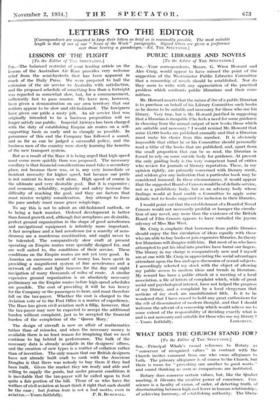LETTERS TO THE EDITOR
[Correspondents are requested to keep their letters as brief as is reasonably possible. The most suitable length is that of one of our " News of the Week" paragraphs. Signed letters are given a preference over those bearing a pseudonym.—Ed. Tim SPECTATOR.]
LESSONS OF THE FLIGHT
[To the Editor of THE: SPECTATOn.]
Eia—The balanced restraint of your leading article on the lessons of the Australian Air Race provides very welcome relief from the semi-hysteria that has been apparent in much of the Daily Press. We were prepared to hail the extension Of the air service to Australia with satisfaction, and the proposed schedule of something less than a fortnight was regarded as somewhat slow, but, for a commencement, sufficiently fast to pass muster. We have now, however, been given a demonstration on our own territory that our notions appear to be slow and old-fashioned. The foreigners have given our pride a nasty jolt. An air service that was originally intended to be a business proposition will no longer satisfy our public. Imperial Airways has been charged with the duty of establishing Empire air routes on a self- supporting basis as early and as cheaply as possible. In pursuance of this end the Company has followed a sound, and as far as can be judged a successful policy, and the business men of the country were slowly learning the benefits of the new transport system.
But as a result of the Race it is being urged that high speed must come more quickly than was proposed. The necessary corollary is that financial considerations must take a secondary
place, not because there was, or is, any N:ery immediate or insistent necessity for higher speed, but because our pride
is not content to leave well alone. High speed of course is the ultimate and very desirable goal. But it is expensive ; and economy, reliability, regularity and safety increase the difficulty of reaching the goal, and they are factors that must receive weighty consideration. Any attempt to force the pace unduly must cause grave misgivings.
To say this is not to admit an old-fashioned outlook, or to being a back number. Ordered development is better than forced growth and, although fast aeroplanes are desirable, perfect ground organization in the shape of good aerodromes and navigational equipment is infinitely more important.
A fast aeroplane and a bad aerodrome (or a scarcity of aero- dromes) are a murderous combination, and ought never to be tolerated. The comparatively slow craft at present Operating on Empire routes were specially designed for, and are well suited to, the conditions of their service. These conditions on the Empire routes are not yet very good. In America an enormous amount of money has been spent in providing a magnificent system of fine aerodromes and a network of radio and light beacons for the day and night navigation of many thousands of miles of route. A similar expensive ground organization is an absolutely necessary preliminary on the Empire routes before high-speed schedules are possible. The cost of providing it will be too heavy for the Company or the passengers to bear, and must therefore fall on the tax-payer. Whether the cost is charged to the Aviation vote or to the Post Office is a matter of expediency. The Race has given civil aviation such a fillip, however, that the tax-payer may now be expected to accept the additional burden without complaint, just as he accepted the financial burden of the completion of the ' Queen Mary.'
The design of aircraft is now an affair of mathematics rather than of miracles, and when the necessary money is available there is no least reason for imagining that we need continue to lag behind in performance. The bulk of the necessary data is already available in the designers' offices, and the creation of new types is a matter of collation rather than of invention. The only reason that our British designers have not already built craft to rank with the American Douglas is that there was nobody to buy them if they had been built. Given the market they are ready and able and willing to supply the goods, but under present conditions it is inevitable that the tax-payer will be called upon to foot quite a fair portion of the bill. Those of us who have the welfare of civil aviation at heart think it right that such should be the case ; but festina lente is not a bad motto, even in














































 Previous page
Previous page